Emphasizing the idea that wealth creation should do no harm, the Economic Survey 2019-20 tabled in Parliament today by the Union Minister for Finance & Corporate Affairs Nirmala Sitharaman, highlighted several ideas on the themes of Sustainable Development and Climate Change. The survey affirmed that the Sustainable Development Goals (SDGs) constitute a befitting framework to answer the developmental challenges to achieve a sustainable future, free from social, economic, and environmental inequalities and thereby ensuring a greener and healthy planet for future generations.
Sustainable Development Goals
As per the Survey, India is striving to combine the element of ‘sustainability’ to its economic development through well designed initiatives for inclusive development enshrined in its policies like electrification of rural households, augmenting usage of renewable sources, eliminating malnutrition, eradicating poverty, increasing access to primary education to all girls, providing sanitation and housing for all, equipping young people with skills to compete in the global labor market, enabling access to finance and financial services.
India and the SDGs
The Survey underscored the fact that India has achieved considerable progress in the field of SDGs as measured by the SDG India Index 2019. As per the SDG Index, Kerala, Himachal Pradesh, Tamil Nadu, Andhra Pradesh, Telangana, Karnataka, Goa, Sikkim, Chandigarh and Puducherry are the front runners. It is noteworthy that none of the States/UTs fall in the Aspirant category in 2019. Overall, it is encouraging to note that the composite score for India in the index has improved from 57 in 2018 to 60 in 2019, indicating the impressive progress made by the country in its journey towards achieving the SDGs.
SDG Nexus: A New Paradigm Approach
The Survey further highlighted that there are linkages among various SDGs and these have strong impacts on reinforcement of policies. This necessitates a ‘nexus’ approach which in turn employs the principles of integrating management and governance across sectors and scales. As per the Survey this envisages looking at systems instead of individual components or short-term outcomes; looking at the inter-related feedbacks from other sectors; and promoting cooperation among sectors while reducing competition for scarce resources.
An example of such a nexus would be the Education and Electricity nexus wherein it has been observed that basic infrastructure like electricity, separate toilets for girls and boys in schools create a healthy and positive environment at schools. Another such nexus would be between Health and Energy, wherein the success of many of the health improvement schemes relies heavily on the availability of electricity at the health centers, the Survey states.
India and its Forests
The Economic survey underlined that as a responsible nation, with the introduction of various schemes, India has been continuously moving towards economic growth, keeping in mind the imperatives of sustainable development. It further highlighted the fact that India is among a few countries in the world where, despite ongoing developmental efforts, forest and tree cover are increasing considerably. The forest and tree cover have reached 80.73 million hectare which is 24.56 per cent of the geographical area of the country. The Survey further highlighted that the States/UTs showing gain in forest cover are Karnataka (1,025 sq. km), Andhra Pradesh (990 sq. km) and Jammu & Kashmir (371 sq. km) whereas those showing loss in forest cover include Manipur, Meghalaya, Arunachal Pradesh and Mizoram. In the Forest Report 2019, the total carbon stock in forest is estimated as 7,124.6 million tons, showing an increase of 42.6 million tons as compared to the last assessment in 2017.
Agricultural Residue Burning – A Major Concern
The Survey recognizes the fact that open burning of crop residues in the agricultural fields has become a major environmental concern. India, being the second largest agro-based economy with year-round crop cultivation, generates a large amount of agricultural waste, including crop residues. Varieties of surplus crop residues are burnt especially in northern States of Punjab, Haryana, UP and Rajasthan. The Survey said that about 178 million tonnes of surplus crop residues are available in the country, burning of which leads to rise in pollutant levels and deterioration of air quality.
The Survey emphasizes that agricultural residue burning contributes significantly in PM2.5 concentrations. The effect of stagnant atmospheric condition over Delhi during the harvest season of Kharif crop further aggravates the deterioration of the ambient air quality over the region.
The Survey suggests various methods to address this issue which include promoting the practice of conservation of agriculture with low lignocellulosic crop residues like rice, wheat, maize, etc., role of agricultural machineries in helping farmers sow the seeds for the next season, creating a market for crop residue-based briquettes & mandating nearby thermal plants to undertake co-firing of crop-residues with coal, special credit lines for financing farm equipment and pollution control as a parameter for deciding incentives to States/UTs.\
The Survey further highlights the Central Sector Scheme on ‘Promotion of Agricultural Mechanization for In-Situ Management of Crop Residue in the States of Punjab, Haryana, Uttar Pradesh and NCT of Delhi’. Under this scheme, agricultural machines and equipment for in-situ crop residue management such as Super Straw Management System for Combine Harvesters, Happy Seeders, Paddy Straw Chopper, Mulcheretc are provided with 50% subsidy to the individual farmers and 80 % subsidy for establishment of Custom Hiring Centres.
Way Forward
The Economic Survey states that increased focus on sustainability requires various actions towards building individual and institutional capacity, accelerating knowledge and enhancing technology transfer and deployment, enabling financial mechanisms, implementing early warning systems, undertaking risk management and addressing gaps in implementation, up scaling and working with a spirit of cooperative federalism between States and Central Government. The Survey finally exhorts the developed countries to honor their financial obligations and promises under the multilateral environmental agreements.


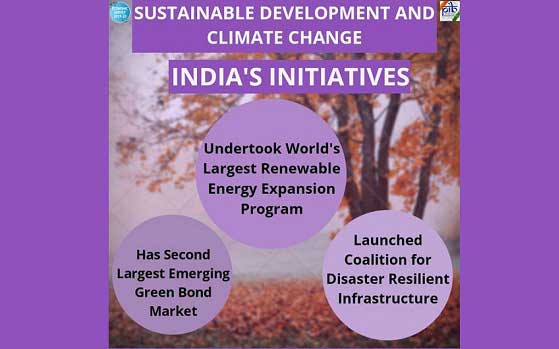
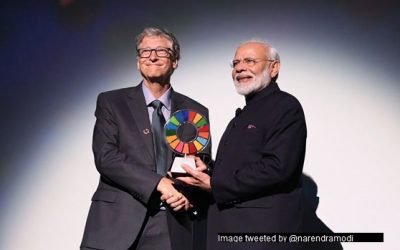
 Prime Minister Narendra Modi received the ‘Global Goalkeeper’ Award by Bill and Melinda Gates Foundation for Swachh Bharat Abhiyan, on 24 September 2019. The award ceremony took place on the sidelines of the United Nations General Assembly (UNGA) session in New York.
Prime Minister Narendra Modi received the ‘Global Goalkeeper’ Award by Bill and Melinda Gates Foundation for Swachh Bharat Abhiyan, on 24 September 2019. The award ceremony took place on the sidelines of the United Nations General Assembly (UNGA) session in New York.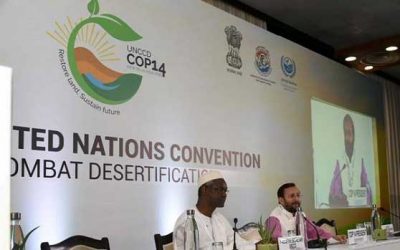
 COP14 witnessed 11 high-level, 30 committee and over 170 stakeholder meetings, 145 side-events, and 44 exhibitions.
COP14 witnessed 11 high-level, 30 committee and over 170 stakeholder meetings, 145 side-events, and 44 exhibitions.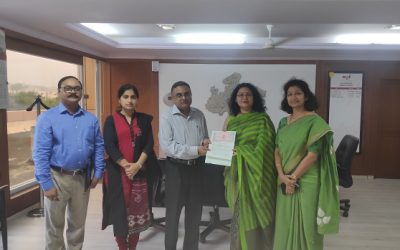
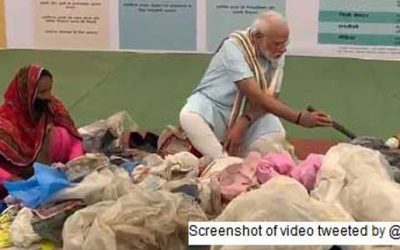

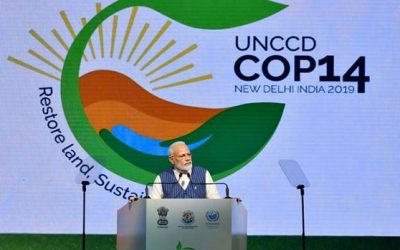
 The Prime Minister reaffirmed India’s commitment to addressing all the three main concerns of the Rio Conventions. He also stated that India has hosted global gatherings through the CoP’s for all the three Conventions. “Going forward, India would be happy to propose initiatives for greater South-South cooperation in addressing issues of climate change, biodiversity and land degradation,” he said.
The Prime Minister reaffirmed India’s commitment to addressing all the three main concerns of the Rio Conventions. He also stated that India has hosted global gatherings through the CoP’s for all the three Conventions. “Going forward, India would be happy to propose initiatives for greater South-South cooperation in addressing issues of climate change, biodiversity and land degradation,” he said. The Environment Minister pointed out that the COP14 has emerged as a global platform to discuss matters of great importance concerning the environment. “More than 190 Countries, 100 Ministers and 8000 participants from all across the globe came together to discuss and work on promotion of land restoration and climate resilience at UNCCD COP14,” he noted.
The Environment Minister pointed out that the COP14 has emerged as a global platform to discuss matters of great importance concerning the environment. “More than 190 Countries, 100 Ministers and 8000 participants from all across the globe came together to discuss and work on promotion of land restoration and climate resilience at UNCCD COP14,” he noted.
0 Comments